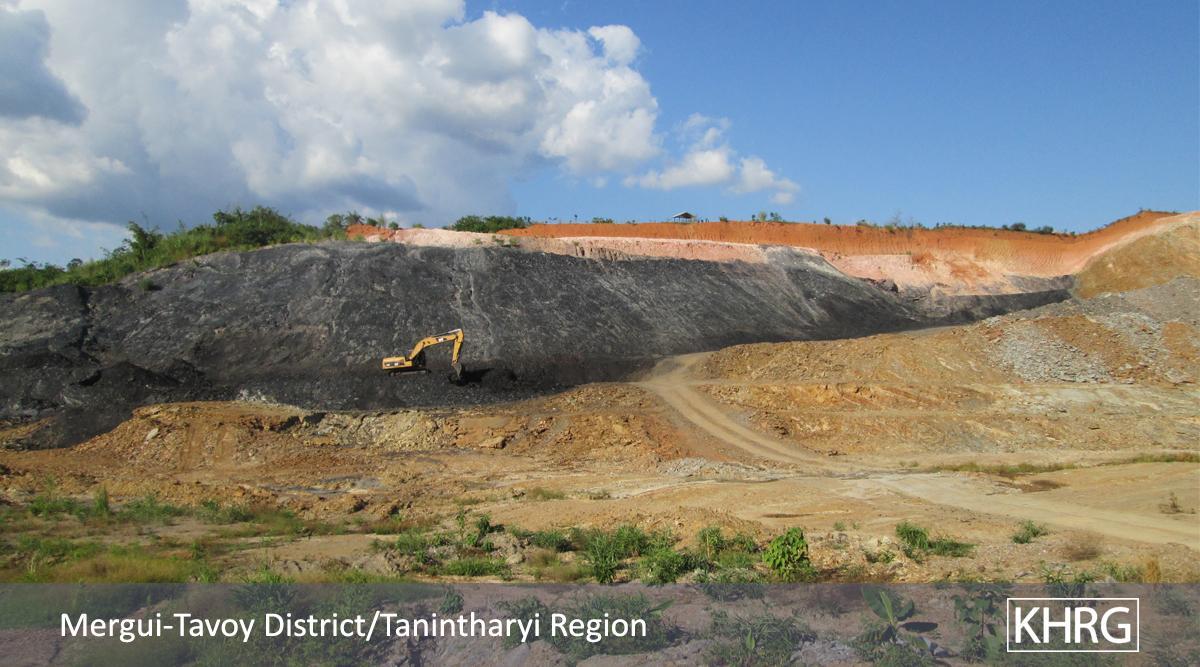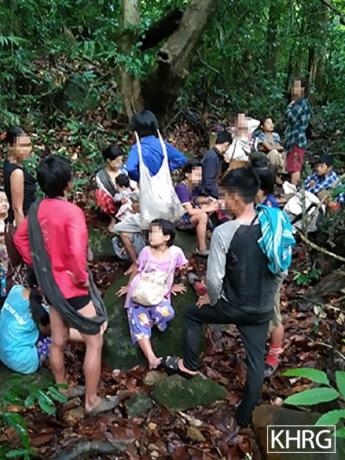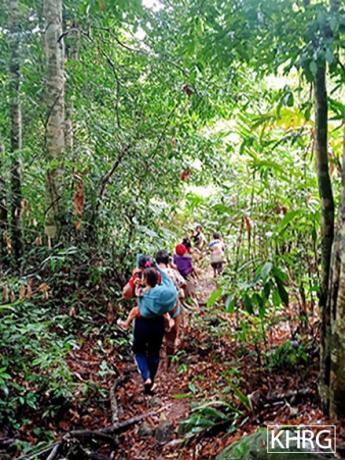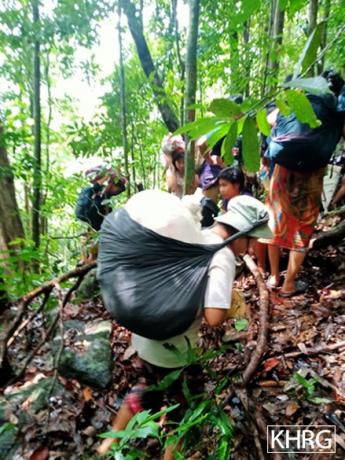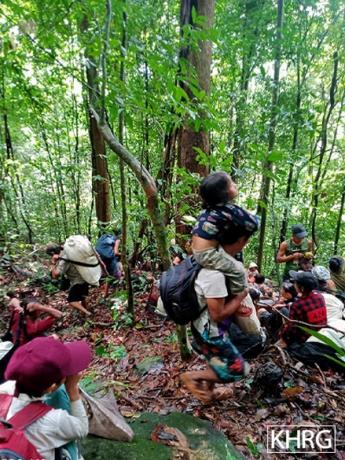This Situation Update describes events that occurred in K’Ser Doh Township, Mergui-Tavoy District during the period between April and May 2022, including armed conflict and challenges related to health care, education, and livelihoods. Following the February 2021 military coup, villagers had difficulty accessing medical treatment due to travel restrictions and nurses not going to work as they were striking for the Civil Disobedience Movement (CDM) or fearing for their safety. Children had difficulty accessing education as most schools in K’Ser Doh Township were closed, and their parents were concerned for their security when sending their children to schools in town. As a result of fighting, villagers in the Paw Hkloh area, K’Ser Kler area, and K’leh Muh Htee area, K’Ser Doh Township, and Htee Ler Klay area, Ler Doh Soh Township had to flee, and were unable to continue their livelihood activities.[1]
Armed conflict, displacement and livelihood challenges
On May 10th 2022, [troops from an unknown battalion of] the Burma [State Administration Army (SAC)[2]] Army travelled to P--- village, Paw HKloh area, K’Ser Doh Township. The Karen National Defence Organisation (KNDO)[3] and the People’s Defence Forces (PDF)[4] ambushed them while they were returning to P--- village. Fighting broke out at 3:40 pm and lasted until 4:50 pm. Burma Army [SAC] troops were injured, so [in retaliation] they indiscriminately shelled mortars into the area. Although the Burma Army's [SAC] indiscriminate shelling resulted in mortar shells landing in the vicinity of P--- village, no casualties were reported. The villagers from P--- village were afraid and fled to K--- village, Paw Hkloh area, K’Hser Doh Township.
On May 14th 2022, at 8:20 am, KNDO troops combined with PDF soldiers attacked the Kyauk Maing Taung police station, which is located in Kyauk Maing Taung village, Paw Hkloh area, K’Ser Doh Township. After the KNDO and PDF suffered casualties and retreated, the Burma Army [SAC] based at the Kyauk Maing Taung police station shelled mortars [in an unspecified area]. Five of the mortars landed in P--- village. The shelling of mortars also caused damage to villagers' betel nut farms.
On May 15th 2022, the Burma Army [SAC] sent more soldiers to the Kyauk Maing Taung police station, resulting in fighting at Shi Maing, Rad D’Su, Thay Ka Toe, and Wa Kon villages, located in Htee Ler Klay area, Ler Doh Soh Township. The fighting lasted the whole day, and the Burma Army [SAC] indiscriminately shelled mortars into the area. The mortars landed close to K--- village, Paw Hkloh area, so some of the K--- villagers and P--- villagers sought refuge deep in the forest in order to survive. Children, the elderly, pregnant women, sick people, and disabled people were included in the displaced population. It was raining during the displacement, so it was hard for children, the elderly, and those who were sick. Some children and elderly people were unable to walk, so other villagers had to carry them through the mountain forests. Villagers who were sick were suffering because there were no nurses, and people were unable to transport medicine with them when they fled. The displaced villagers had to travel for three nights [before they could find a place to stay] in the jungle. Some people had to sleep in the rain. People only constructed shelters for the elderly and children. There wasn’t enough equipment or food, so some of the displaced people got sick. The displaced people were facing disease and illness such as malaria, vomiting blood, diarrhoea, high blood pressure, and low blood pressure. There wasn’t enough medicine nor any health workers to treat these conditions.
On June 17th 2022, the villagers felt unsafe, so they moved to a new location and slept there [unidentified location]. On June 18th 2022, the villagers fled again to T-- village, Paw Hkloh area, K'Hser Doh Township. Then, the displaced people were relocated [by Karen National Union (KNU)[5]-appointed administrators] to T--- section and M--- section of Paw Hkloh area.
It was raining heavily at about 10:00 pm on June 18th 2022 when the villagers reached Poe La mining site in Paw Hkloh area, K’Hser Doh Township. When the villagers reached Poe La mining site, local villagers distributed some clothes and food to them. The KNDO leaders contacted the local authorities, and the local authorities picked them [the displaced villagers] up and sent them to T---village. They arrived at T--- village at 1:00 am. When the displaced people reached T--- village, many were suffering from colds and fevers; the children got diarrhoea; and the elderly did not feel well because it rained heavily during their travels and they didn’t have clean water to drink. Therefore, the health workers and villagers of T--- village took care of them.
The displaced people received food from the Ta K’Paw organisation [a local community-based organisation] and communities from Paw Hkloh area and K’Hser Doh Township prepared food for them. They also received clothes from villagers of W--- village, Paw Hkloh area. The displaced people were worried that if the situation did not get better, there would be food problems [shortages], and their houses and farms would be damaged and their livestock killed. Children, pregnant women, and the elderly were in need of nutritious food. Some people were unable to continue their plains farming and hill farming activities due to the armed conflict. [As of April 2023, the displaced villagers returned to their village].
Healthcare
In Paw Hkloh area, K’Ser Doh Township, Mergui-Tavoy District, the prevailing diseases villagers face are malaria, gastroenteritis, and the common cold. Most of the local people who get these diseases use traditional medicine (herbs) to cure their disease because they know how to practice traditional medicine. They have to find the herbs in the jungle and produce the medicine (some people drink it and take baths with it). Villagers who do not understand traditional medicine seek treatment from those who sell [western] medicine.
After the military coup, nurses [from Paw Hkloh area] joined the Civil Disobedience Movement (CDM)[6], so they stopped going to the clinic [as some were striking and as others were concerned about their security]. As a result, there were no nurses at the K’Ser Doh Township clinic, so the clinic had to close. The villagers who lived close to the township’s clinic would normally go to this clinic for their treatment when they were sick.
The patients in critical condition were sent to K---village, to H--- hospital after the clinic closed. Even though H--- hospital is a good option for treatment, it is very expensive, so some villagers were unable to pay for their treatment and passed away [due to lack of medical treatment]. Furthermore, when the villagers have to go and check their health in town, they need to request a recommendation or permit letter from the SAC administrator. When fighting occurred, the SAC soldiers closed the road, and some villagers passed away because they were unable to travel for treatment.
Education
[Karen Education and Culture Department (KECD)[7]] schools in K’Ser Hkler area, K’Ser Doh Township were closed [before July 2022, when they reopened]. Due to schools being closed, the students were unable to learn to read and write, and so some students got married [to found a family instead]. The Karen Baptist Convention organised alternative studies for children twice per week. The classes ranged from kindergarten to middle school. The Karen Baptist Convention organised for teachers to teach in their own village, and some students are attending these classes.
However, some of the SAC-run schools were open in Kleh Mu Htee area in K’Ser Doh Township. Even though the schools opened, there weren’t enough teachers [to run them]. The SAC-run schools were opened only in Bamar[8] villages [villages where most villagers are Bamar]. Because of the fighting, there were no teachers, and the students' parents also didn’t [were afraid to] send their children to school.
An SAC-run school remained open in W---village, Paw Hkloh area, K’Ser Doh Township. Even though the school was open, there weren’t enough teachers because some joined the CDM. Additionally, [any education that students complete at SAC-run schools] wouldn't be recognized by the National Unity Government (NUG)[9], so students didn’t want to go to this school. Some students went to the school for a whole week but the teachers didn’t teach anything, so they [the students] didn’t want to continue attending the school. Some students' parents wanted to send their children to schools located in W---village and Tavoy town [located in SAC-controlled area], but they dared not because they were worried that bomb explosions would occur at the school and injure their children.
Further background reading on the human rights and security situation in Mergui-Tavoy District in Southeast Burma can be found in the following KHRG reports:
- “Mergui-Tavoy District Situation Update: Arbitrary arrest and detention, looting and property damage, indiscriminate shelling, SAC militarisation, movement restrictions, and livelihood challenges, June to September 2022”, March 2023.
- “Mergui-Tavoy District Situation Update: Military activity, shelling and displacement, May to June 2022”, January 2023.
- “Mergui-Tavoy District Situation Update: SAC military activities and travel restrictions, livelihood challenges, education, an armed clash, displacement and indiscriminate shelling by the SAC, April to May 2022”, December 2022.
- “Mergui-Tavoy District Situation Update: Shelling, displacement, threats, arrest, travel restrictions and telecommunication shutdowns in Ler Doh Soh Township, April to May 2022”, August 2022.
Footnotes:
[1] The present document is based on information received in June 2022. It was provided by a community member in Mergui-Tavoy District who has been trained by KHRG to monitor human rights conditions on the ground. The names of the victims, their photos and the exact locations are censored for security reasons. The parts in square brackets are explanations added by KHRG.
[2] The State Administration Council (SAC) is the executive governing body created in the aftermath of the February 1st 2021 military coup. It was established by Senior General Min Aung Hlaing on February 2nd 2021, and is composed of eight military officers and eight civilians. The chairperson serves as the de facto head of government of Burma/Myanmar and leads the Military Cabinet of Myanmar, the executive branch of the government. Min Aung Hlaing assumed the role of SAC chairperson following the coup.
[3] The Karen National Defence Organisation (KNDO) was formed in 1947 by the Karen National Union and is the precursor to the Karen National Liberation Army (KNLA). Today the KNDO refers to a militia force of local volunteers trained and equipped by the KNLA and incorporated into its battalion and command structure; its members wear uniforms and typically commit to two-year terms of service.
[4] The People’s Defence Force (PDF) is an armed resistance established independently as local civilian militias operating across the country. Following the February 1st 2021 military coup and the ongoing brutal violence enacted by the junta, the majority of these groups began working with the National Unity Government (NUG), a body claiming to be the legitimate government of Burma/Myanmar, which then formalized the PDF on May 5th 2021 as a precursor to a federal army.
[5] The Karen National Union is the main Karen group opposing the government.
[6] On February 2nd 2021, healthcare workers at state-run hospitals and medical facilities across Myanmar spearheaded what is being referred to as a Civil Disobedience Movement (CDM) consisting of labour strikes in protest against the February 1st 2021 military coup. The movement quickly spread to include civil servants from all sectors of the government who are walking off their jobs as a way of non-recognition and non-participation in the military regime. Because of the popularity of the movement, and its seminal role in wider protests across the country, some people have begun using it as a catch-all phrase to include other protest forms like boycotts and pot-banging.
[7] The Karen Education and Culture Department is the education department of the Karen National Union. Its main goals are to provide mother tongue education services to rural Karen populations in Southeast Myanmar, as well as to preserve the Karen language, culture and history. Despite being an important education provider in the region, it is not officially recognised by the Myanmar government.
[8] The majority ethnic group in Myanmar, also known as ethnic Burmese or Burman.
[9] The National Unity Government (NUG) was formed by the acting cabinet of the Committee Representing Pyidaungsu Hluttaw (CRPH) on April 16th 2021, following the February 1st military coup. U Min Wyint was retained as President, and Daw Aung San Suu Kyi as State Counsellor, both still under detention by the State Administration Council (SAC) military. The NUG claims to be the legitimate government of Myanmar, and has sought international recognition as such. The NUG cabinet is composed primarily of lawmakers elected in the 2020 election, along with other key ethnic figures. As the military junta has declared the NUG illegal, it is operating as a government-in-exile. On May 5th 2021, the NUG announced the formation of a "People’s Defence Force" to serve as its armed wing. Further information can be found at the NUG website: https://www.nugmyanmar.org/en/.

